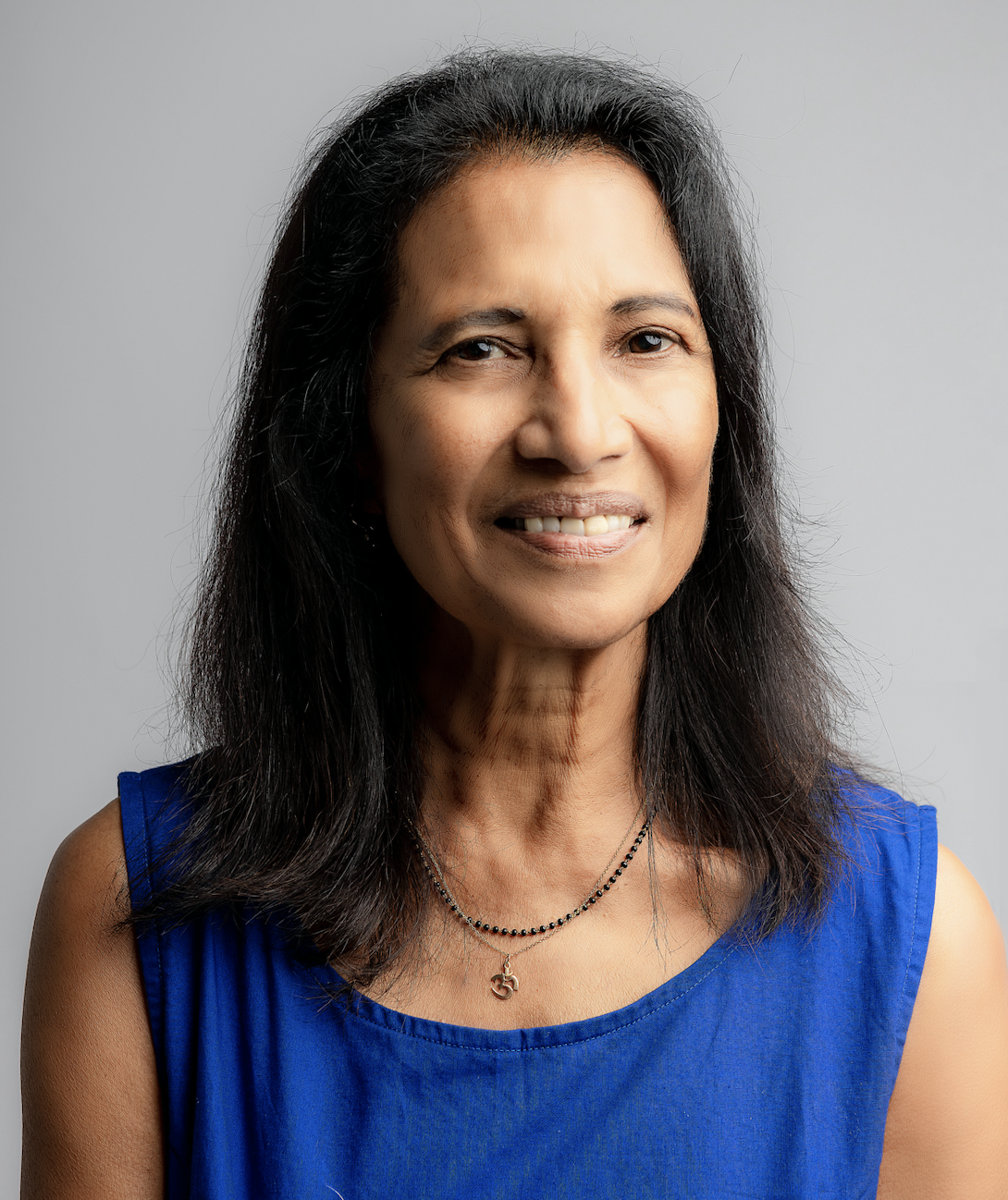
Shakuntala Haraksingh Thilsted
TRinidad & Tobago and denmark
Dr. Shakuntala Haraksingh Thilsted, native of Trinidad and Tobago and a citizen of Denmark, will receive the 2021 World Food Prize for her groundbreaking research, critical insights and landmark innovations in developing holistic, nutrition-sensitive approaches to aquaculture and food systems. By bringing together interdisciplinary and international collaborators, she drove transformations in aquatic food systems to deliver improved nutrition, resilient ecosystems and secure livelihoods for millions of vulnerable people across the globe.
Dr. Shakuntala Haraksingh Thilsted, Global Lead for Nutrition and Public Health, WorldFish, said, "I am truly honored to receive the 2021 World Food Prize, and I am deeply humbled to be placed in such distinguished ranks as those of past laureates. Aside from personal joy and gratitude, as a scientist, I feel this award is an important recognition of the essential but often overlooked role of fish and aquatic food systems in agricultural research for development. Fish and aquatic foods offer life-changing opportunities for millions of vulnerable women, children, and men to be healthy and well-nourished."
Biography
Thilsted’s trailblazing research on small native fish species in Bangladesh led to the development of nutrition-sensitive approaches to aquatic food systems at all levels, from the farm to food processing to final consumers, resulting in improved diets for millions of the most vulnerable people in Asia and Africa. Nutrition-sensitive approaches place nutrition and public health at the core of how food is produced, processed, transported, priced, distributed and consumed. Thilsted expanded the evolution of food systems from “feeding” to “nourishing” hundreds of millions of people who depend on fish and other aquatic foods as an integral part of their food and nutrition security, livelihoods and culture.
While fashioning more productive and sustainable aquaculture practices for smallholder farmers, Thilsted proceeded to rejuvenate agro-ecosystems, broaden biodiversity and activate women’s involvement in fisheries. She extended her mission to increase fish consumption through the creation and widespread use of safe, nutritious fish-based foods and reduction of food waste.
“The potential of diverse and nutritious aquatic foods is ripe for harvesting, offering a path to produce sufficient food supply without increasing carbon emissions while reducing ecosystem stress and habitat loss,” said Thilsted.
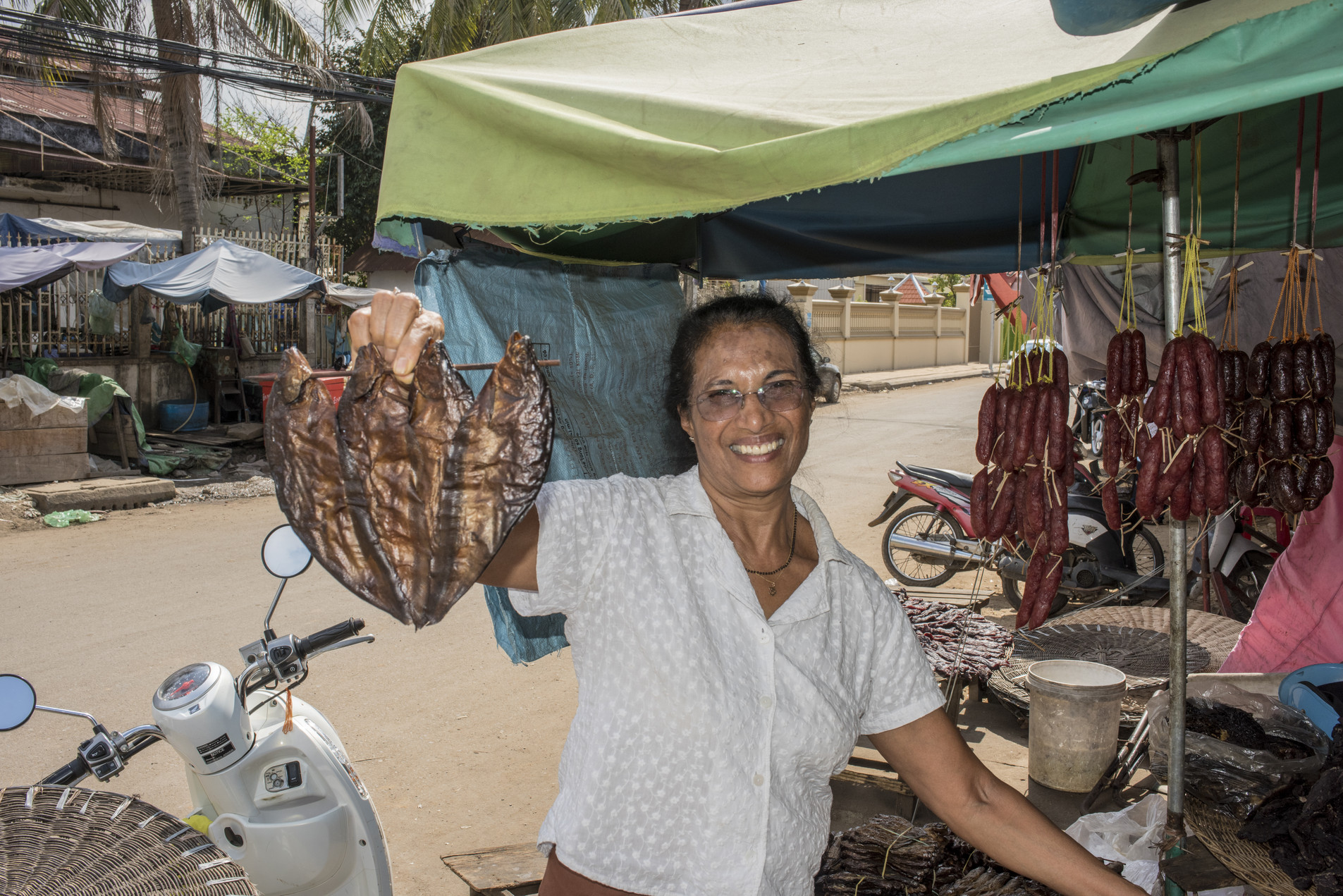 Commencing her career as the first and only woman in the Ministry of Agriculture, Lands and Fisheries on the island of Tobago, Thilsted now serves as the Global Lead for Nutrition and Public Health at WorldFish, a global CGIAR research center headquartered in Malaysia. Her work guides WorldFish, other research institutions, major funders, government agencies and public and private organizations to work together to reshape food systems to deliver on the UN Sustainable Development Goals. Young researchers Thilsted has mentored now use her holistic approach to increase the sustainable production and consumption of nutritious fish and fish-based foods in Asia, Africa and the Pacific. As an adviser to heads of state, ministers, high-level panels and international boards, she provides direction for research, policies and practices in pursuit of improved food systems that boost biodiversity, enhance environments, reinforce resilient communities, increase incomes, empower women and provide adequate nutrition for all.
Commencing her career as the first and only woman in the Ministry of Agriculture, Lands and Fisheries on the island of Tobago, Thilsted now serves as the Global Lead for Nutrition and Public Health at WorldFish, a global CGIAR research center headquartered in Malaysia. Her work guides WorldFish, other research institutions, major funders, government agencies and public and private organizations to work together to reshape food systems to deliver on the UN Sustainable Development Goals. Young researchers Thilsted has mentored now use her holistic approach to increase the sustainable production and consumption of nutritious fish and fish-based foods in Asia, Africa and the Pacific. As an adviser to heads of state, ministers, high-level panels and international boards, she provides direction for research, policies and practices in pursuit of improved food systems that boost biodiversity, enhance environments, reinforce resilient communities, increase incomes, empower women and provide adequate nutrition for all.
Fishing For First-Rate Nutrition
In evaluating the nutritional composition of small native fish species in Southeast Asia, Thilsted was the first to establish that commonly consumed small fish were important sources of essential micronutrients and fatty acids. She led groundbreaking research showing that the content and bioavailability of necessary nutrients in small fish species were much higher than previously reported, and revealing that consuming fish enhanced the absorption of nutrients from plant-based foods. This new, expanded knowledge of the nutritional profile of fish reshaped the scientific understanding of the benefits of fish in diets.
“Eating more fish and other aquatic foods means a more diverse and nutritious diet. Aquatic food needs more space on people’s plates across the world,” Thilsted said.
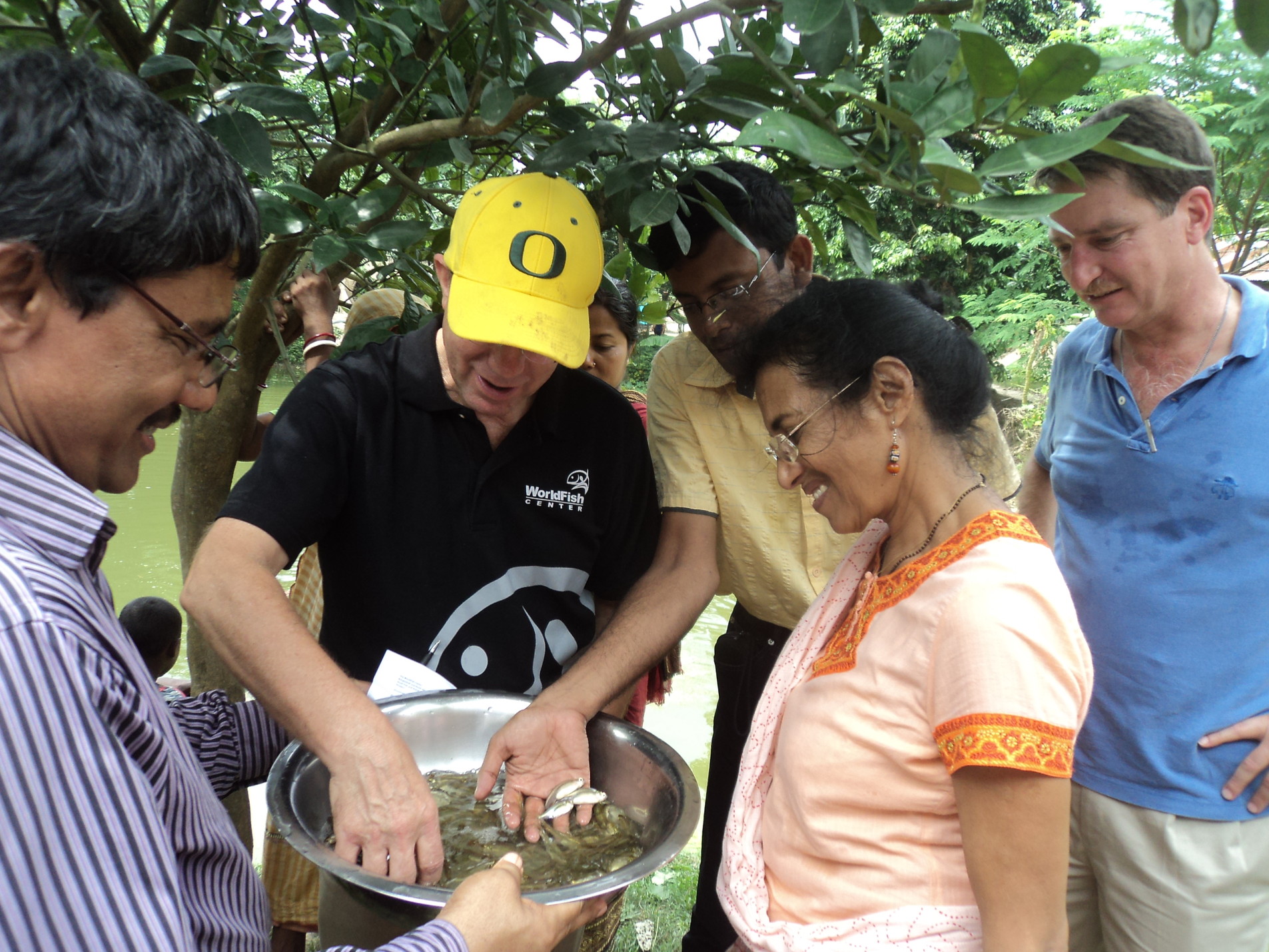 With this information, Thilsted set out to increase consumption of small fish, especially for women and their children in the first 1000 days of life, the most critical period for nutrition in a child’s development. To this end, Thilsted pioneered more productive, environmentally responsible fish farming methods; developed culturally appropriate fish-based foods; and promoted nutrition-sensitive practices and policies with communities, researchers, development agencies and government institutions.
With this information, Thilsted set out to increase consumption of small fish, especially for women and their children in the first 1000 days of life, the most critical period for nutrition in a child’s development. To this end, Thilsted pioneered more productive, environmentally responsible fish farming methods; developed culturally appropriate fish-based foods; and promoted nutrition-sensitive practices and policies with communities, researchers, development agencies and government institutions.
In Bangladesh, smallholder farmers supply the majority of fish production from the country’s four million household ponds. In the 1970s, most fish farmers “cleaned” their ponds with pesticides.This expensive practice was thought to eliminate competition from the small, lower-yielding native fish species before farmers stocked their ponds with more marketable fish such as carp or tilapia.
From her research, Thilsted knew the importance of small, native fish species, such as mola, for a nutritious diet. Working closely with Dr. Abdul Wahab, Dean of the Faculty of Fisheries at the Bangladesh Agricultural University (BAU), she initiated a partnership with BAU and the Royal Veterinary and Agricultural University (now part of the University of Copenhagen) in the 1990s. Together, they led a talented team of Bangladeshi and Danish students and researchers in developing pond polyculture systems, farming small fish together with large fish.
Contrary to popular belief at the time, small fish did not compete with large fish for space or food. Instead, the approach increased total productivity by as much as five times, as well as enhancing species diversity and nutritional value of the production. Consumption of fish in the home increased when Thilsted introduced an inexpensive, homemade gill net designed for women to easily harvest mola in small amounts for daily household use. Importantly, though mola only accounted for 15 percent of production by weight, it contributed 54 percent of vitamin A, 42 percent of vitamin B12 and a quarter of the calcium and iron of the needs of a family of four.
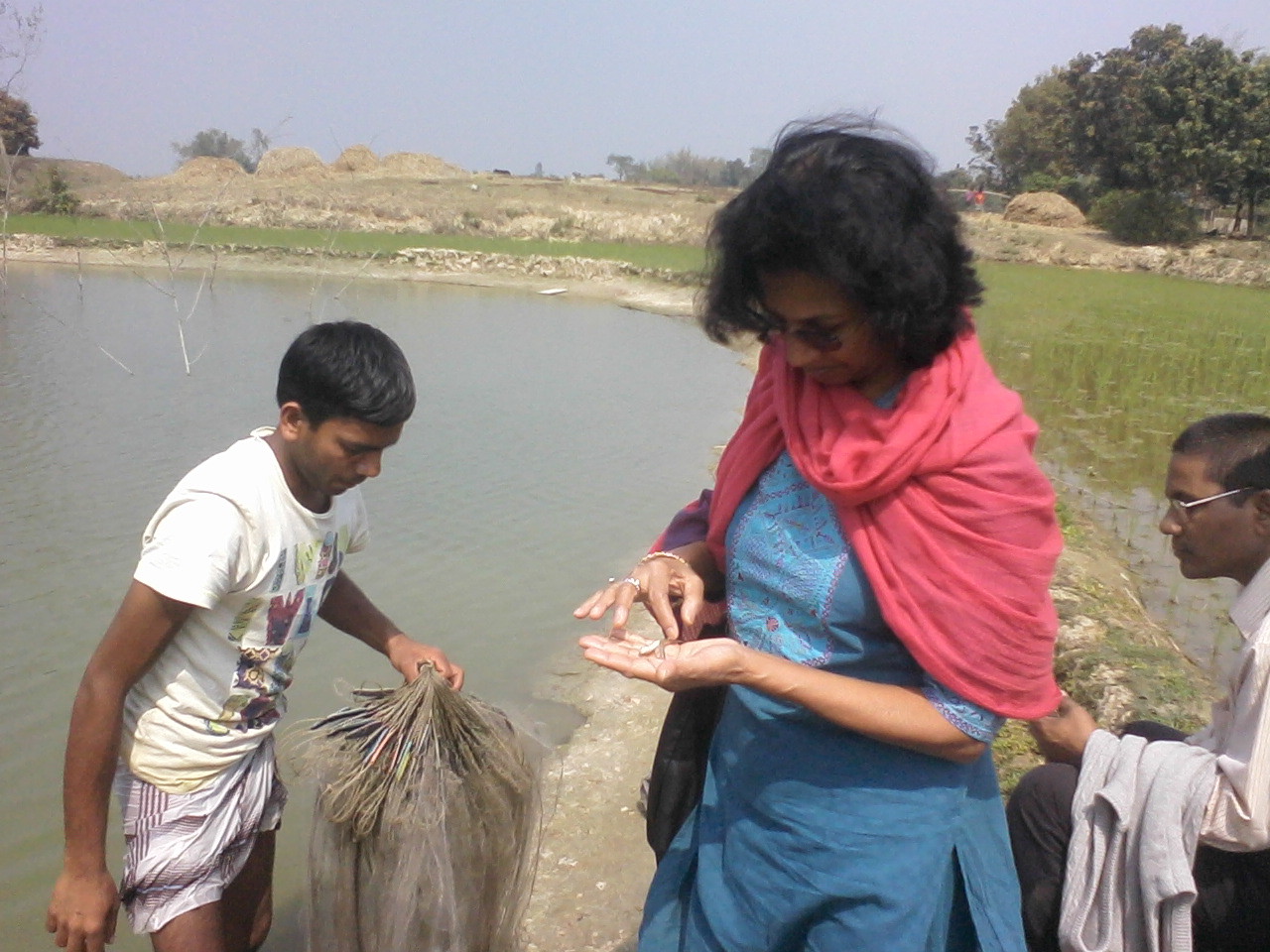 As a woman and a researcher espousing better nutrition rather than simply increasing production, Thilsted strove against the current to convince others of the merits of pond polyculture. Her efforts paid off in 2004 when the Bangladesh Ministry of Fisheries and Livestock banned cleaning ponds and prohibited the use of pesticides to kill naturally occuring fish. Thilsted had convinced the leadership of a nation to convert to practices that were not only more economical and nutrition-sensitive, but reduced environmental pressures, habitat loss and health risks in rural communities.
As a woman and a researcher espousing better nutrition rather than simply increasing production, Thilsted strove against the current to convince others of the merits of pond polyculture. Her efforts paid off in 2004 when the Bangladesh Ministry of Fisheries and Livestock banned cleaning ponds and prohibited the use of pesticides to kill naturally occuring fish. Thilsted had convinced the leadership of a nation to convert to practices that were not only more economical and nutrition-sensitive, but reduced environmental pressures, habitat loss and health risks in rural communities.
Understanding that increased fish production was just one part of nutrition-sensitive food systems, Thilsted extended her innovative approach by creating new, ready-to-use, fish-based foods especially targeted for mothers and their young children, who are particularly vulnerable to micronutrient deficiencies. Building on popular local recipes, she developed original whole dried fish food products, such as fish chutney and fish powder, with four times the nutrient density of fresh fish. Improvements in processing practices also resulted in reduced fish waste and loss and increased incomes for entrepreneurs, most of them women, who produced these value-added foods.
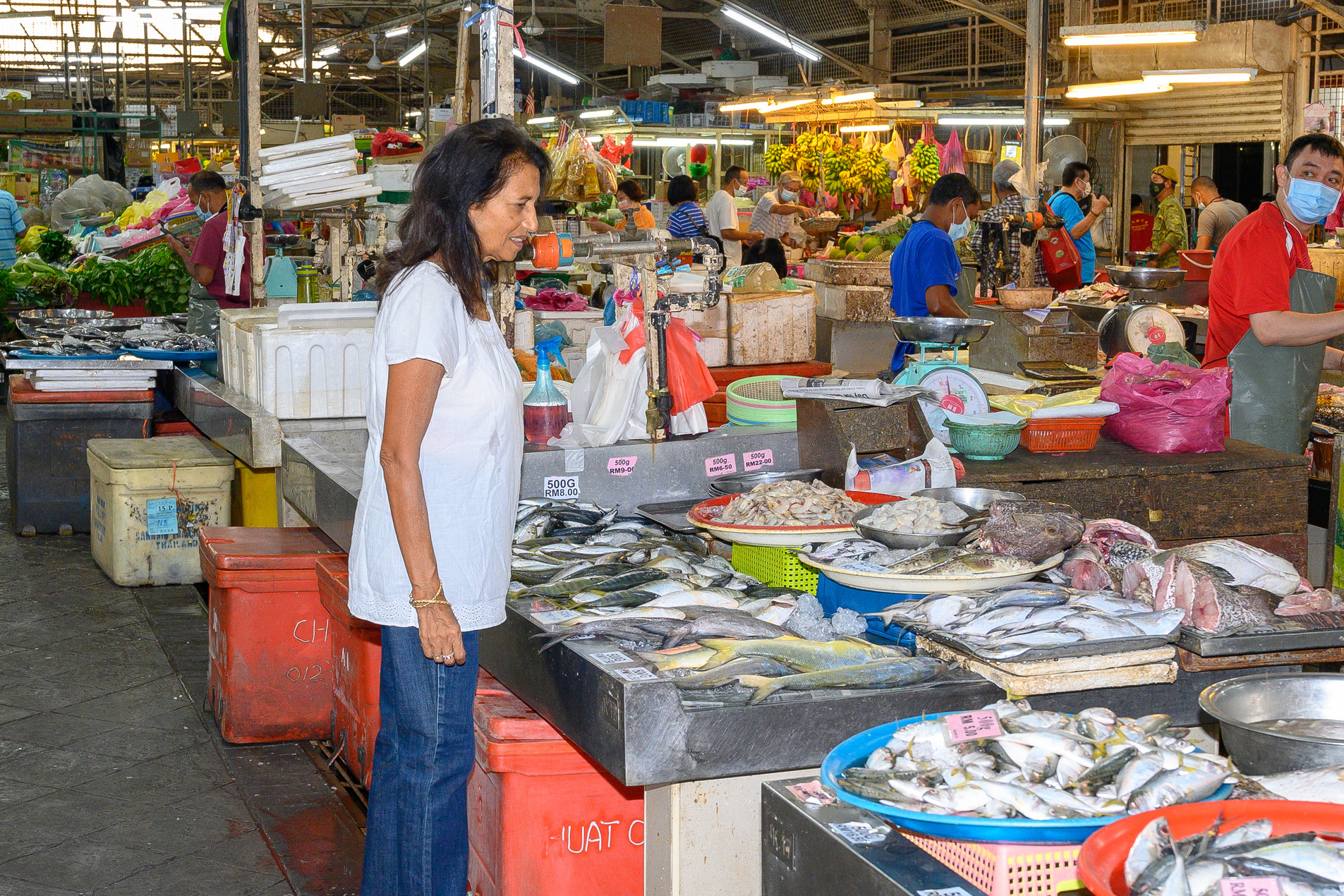 Guided by her insights into the role of fish in increasing the absorption of minerals from plant-source foods, she created highly nutritious combinations of dried fish, high-iron rice and vitamin A-rich orange sweet potato. She then promoted pond polyculture together with sweet potato and vegetable cultivation as a practical way for rice farmers to diversify their farms and diets. In Cambodia, where millions of people depend on rice field fisheries for income and food, she helped establish rice field ponds to produce fish through the dry season.
Guided by her insights into the role of fish in increasing the absorption of minerals from plant-source foods, she created highly nutritious combinations of dried fish, high-iron rice and vitamin A-rich orange sweet potato. She then promoted pond polyculture together with sweet potato and vegetable cultivation as a practical way for rice farmers to diversify their farms and diets. In Cambodia, where millions of people depend on rice field fisheries for income and food, she helped establish rice field ponds to produce fish through the dry season.
BRAC and the Copenhagen Consensus Center evaluated Thilsted’s pond polyculture system as one of the most cost-effective methods of supplying nutrients in Bangladesh. For supplying vitamin A alone, pond polyculture generated 3.5 U.S. dollars of benefits for each dollar spent. This conclusion prompted the government of Bangladesh to promote pond polyculture as the foremost food-based intervention in its country investment plan, dramatically increasing the supply and consumption of fish produced across the country by smallholder farmers, 60 percent of them women. Since 2000, aquaculture production in Bangladesh has increased threefold and the sector now supports 18 million people, making Bangladesh the fifth largest aquaculture producer in the world. Increased incomes and access to nutritious fish contributed to Bangladesh cutting chronic hunger by more than half and the number of underweight children by one quarter within the same period.
“When I visited the villages in which pregnant women had got the fish chutney, villagers will greet me, saying: ‘Come let us show you the Pusti Bachcha,’ meaning ‘Well-nourished Children’ – and they would lead me to a home with a glad mother and a well-nourished child,” said Thilsted.
Advancing An Aquatic Foods Approach
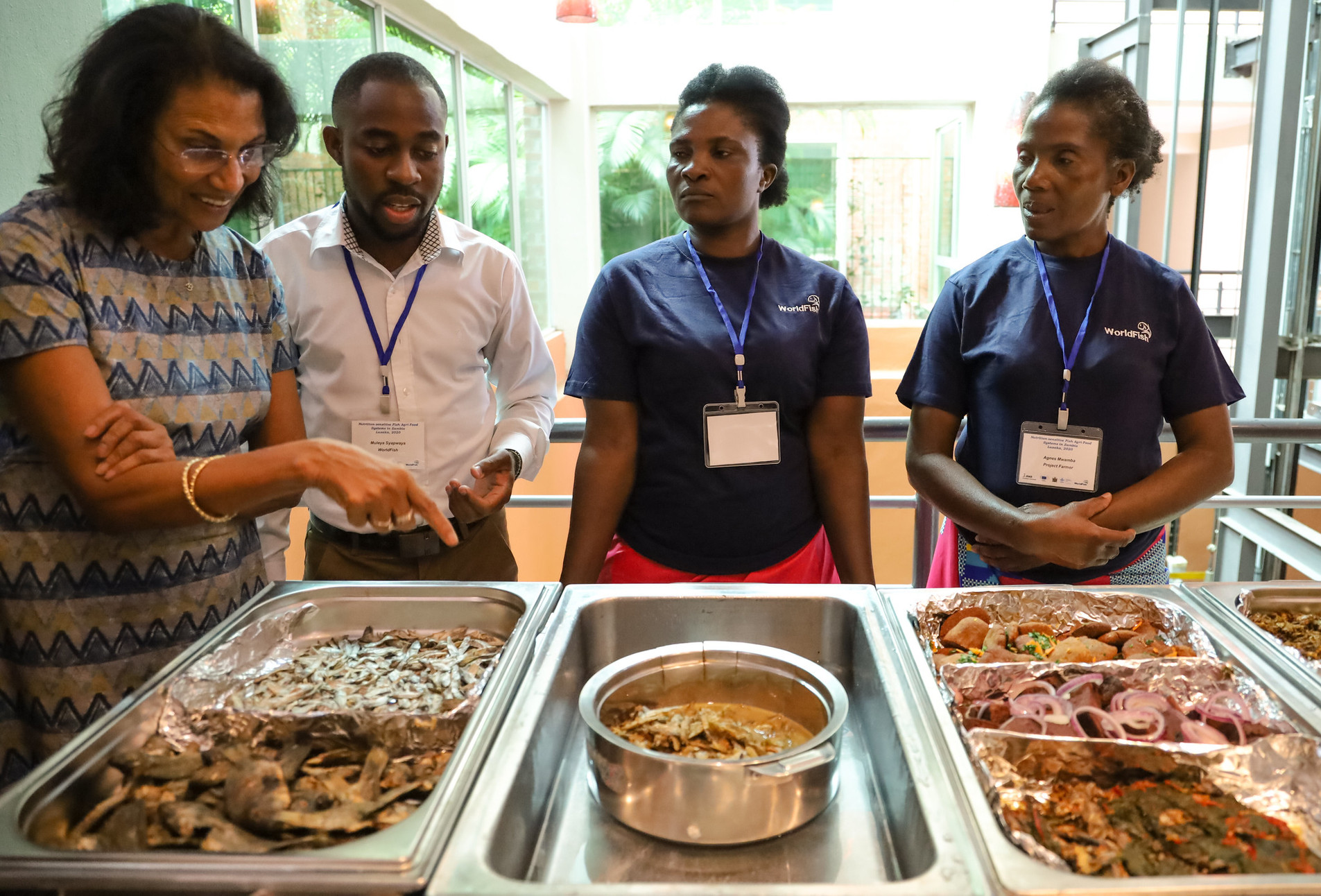 Thilsted’s seminal achievements in developing, testing and piloting practical and sustainable nutrition-sensitive approaches to aquaculture and food systems greatly increased the supply and year-round consumption of nutritious, safe fish and fish products in Bangladesh. Through her efforts, this approach was scaled up and gained traction in nourishing nations in Asia and Africa, including Cambodia, India, Myanmar, Nepal, Malawi, Sierra Leone and Zambia. In these countries and others, she has spearheaded curriculum development and capacity-building at universities and national research institutions and advised governments and international and regional development agencies regarding nutrition-sensitive food systems.
Thilsted’s seminal achievements in developing, testing and piloting practical and sustainable nutrition-sensitive approaches to aquaculture and food systems greatly increased the supply and year-round consumption of nutritious, safe fish and fish products in Bangladesh. Through her efforts, this approach was scaled up and gained traction in nourishing nations in Asia and Africa, including Cambodia, India, Myanmar, Nepal, Malawi, Sierra Leone and Zambia. In these countries and others, she has spearheaded curriculum development and capacity-building at universities and national research institutions and advised governments and international and regional development agencies regarding nutrition-sensitive food systems.
“Governments interested in boosting both health and economic growth, and doing so sustainably, should find ways to redesign supply chains to deliver fish to poor, malnourished people, whether they live close to the sea or inland waters or not,” said Thilsted. “With the right policies in place, ensuring local populations have better access to more fish could cut public health costs, help meet climate goals and foster the rise of lucrative, domestic fish industries.”
By collaborating with Thilsted and WorldFish, organizations such as the U.S. Agency for International Development, Danish International Development Assistance, European Union, World Bank, African Development Bank, International Fund for Agricultural Development, UNICEF and the Bill & Melinda Gates Foundation have sponsored projects that successfully piloted fish-based food programs to aid hundreds of thousands of people living in marginalized communities, particularly women and children, refugees and displaced people. One such project of the World Food Programme is leveraging Thilsted’s work to meet the nutrition needs of one million Rohingya refugees. By working with local fisheries and groups of women entrepreneurs, they have expanded the supply of solar-dried fish to local shops serving the community, making dried fish and fish products an easily accessible source of nutrition for refugees.
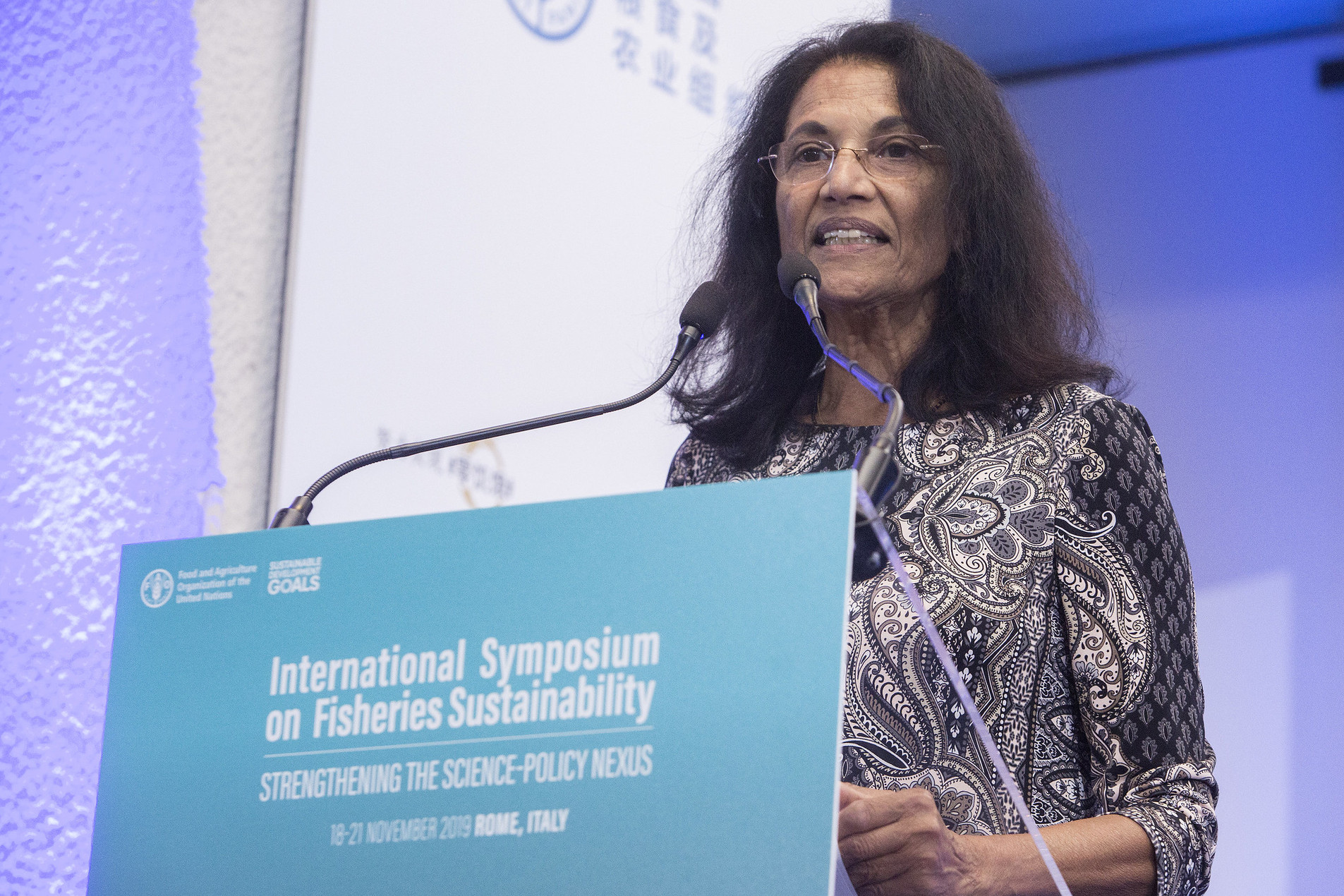 Thilsted is setting the agenda for nutrition-sensitive, holistic supply chain development for her research peers, national and global policy-makers and public and private sector actors. Appointed Champion and the Vice-chair of Action Track 4: Advance Equitable Livelihoods of the UN Food Systems Summit 2021, Thilsted is guiding the Summit’s work related to building sustainable and equitable food systems and value chains that reduce risks and enable entrepreneurship. She is a Steering Committee member for the High Level Panel of Experts on Food Security and Nutrition, advising policy recommendations on a wide range of food security and nutrition topics. She is also involved with the Global Action Network in mobilizing activities for the UN Decade of Ocean Science for Sustainable Development (2021-2030) and UN Decade of Action on Nutrition (2016-2025).
Thilsted is setting the agenda for nutrition-sensitive, holistic supply chain development for her research peers, national and global policy-makers and public and private sector actors. Appointed Champion and the Vice-chair of Action Track 4: Advance Equitable Livelihoods of the UN Food Systems Summit 2021, Thilsted is guiding the Summit’s work related to building sustainable and equitable food systems and value chains that reduce risks and enable entrepreneurship. She is a Steering Committee member for the High Level Panel of Experts on Food Security and Nutrition, advising policy recommendations on a wide range of food security and nutrition topics. She is also involved with the Global Action Network in mobilizing activities for the UN Decade of Ocean Science for Sustainable Development (2021-2030) and UN Decade of Action on Nutrition (2016-2025).
Thilsted’s focus on developing practical, scalable solutions that fit seamlessly into the livelihoods of those who need them most magnifies her impact on resilient food systems that are responsive to nutrition concerns. Her leadership and mentoring of many young researchers seeking to improve access to affordable fish has begun to pay great dividends. Their collective efforts have benefited nutrition outcomes for millions of people and are reaching more vulnerable populations every day. Her work spotlights the critical role sustainable aquatic food systems must play in the health of both people and the planet, as nations charge forward to achieve the UN Sustainable Development Goals by 2030.
“It's time the world finally took advantage of fish and other aquatic foods as superfoods that fuel minds, bodies and economies. Submerged for too long, aquatic food solutions need to rise to the top of the global agenda,” said Thilsted.
Island Origin and Inspiration
Shakuntala was born in 1949 in the Caribbean island of Trinidad in the small village of Reform, where the main industry was sugar production. Most of the inhabitants, including Shakuntala’s family, were descendants of Indian Hindu migrants brought to Trinidad to engage in agricultural labor. Most families had access to land owned by a sugar factory, where they grew not only sugarcane but rice and other food crops for their household.
Thilsted developed her attention to detail at an early age, as she seldom made a mistake when helping to balance the ledgers in her grandfather’s shop or forgot a name when helping her mother run the postal service. Though the sweets in her grandfather’s shop were more appealing to her friends as children, Thilsted valued the smoked herring, salted cod and tinned tuna and salmon sold in the shop that were the basis of some of her favorite meals.
 Thilsted loved growing up in a four generation household, where the kitchen was the heart of the home. Her grandmother presided over cooking meals for the family, and instilled in young Shakuntala an appreciation for good food and its importance to good health. Observing the nuances of her grandmother’s cooking taught Thilsted to look for and appreciate the fine details of food preparation in the many places she has worked.
Thilsted loved growing up in a four generation household, where the kitchen was the heart of the home. Her grandmother presided over cooking meals for the family, and instilled in young Shakuntala an appreciation for good food and its importance to good health. Observing the nuances of her grandmother’s cooking taught Thilsted to look for and appreciate the fine details of food preparation in the many places she has worked.
Thilsted attended Naparima Girls’ High School from the age of ten. Her teachers helped her cultivate interests in many different subjects, from math and science to languages, geography and history, developing a passion for interdisciplinary scholarship and learning skills, principles and values she has drawn on throughout her life. She in turn has guided thousands of young people, particularly young women, in their early careers in science.
“What a privilege it is to plant an idea in the mind of a young person and that person taking it to heights that you have never imagined,” said Thilsted. “What do we do if we want to make a better world? There is no other way to do it than the generations who come after us.”
Thilsted completed her undergraduate education at the Trinidad campus of the University of the West Indies, where she earned a B.Sc. in Tropical Agriculture in 1971. While working as an Agricultural Officer in Tobago, she met her husband, Finn Thilsted. After marrying, they moved to Finn’s home country of Denmark where Shakuntala took up post-graduate studies under the mentorship of Dr. Poul Martin Riis. In 1980, she was awarded a Ph.D. in Physiology of Nutrition from the Royal Veterinary and Agricultural University, where she went on to become an associate professor. Alternating between teaching in Denmark and working with her husband on diplomatic missions all over the developing world, Thilsted began assembling international teams to work on projects to improve nutrition for women and young children.
In Bangladesh in the late 1980s, Thilsted worked as a Nutrition Coordinator at the International Centre for Diarrhoeal Disease Research. Over 6,000 children were brought to the center each year for rehabilitation of severe cases of malnutrition.
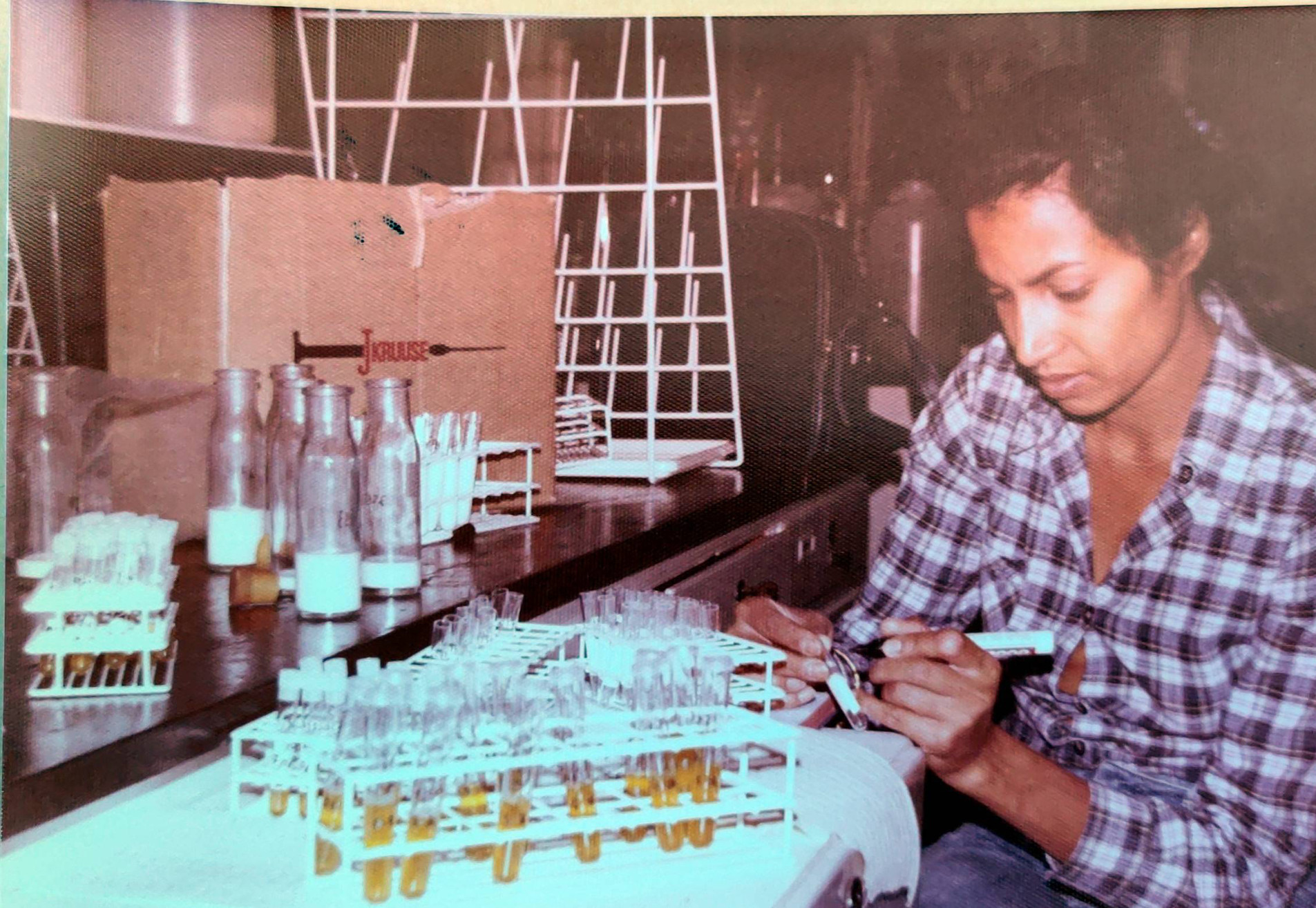 Thilsted drew on elements from various disciplines to make changes in the nutrition rehabilitation unit to improve the outcomes for the children. She started a kitchen garden to provide fresh vegetables for more nutritious meals, involved the mothers in preparing the meals for their children, and had patients eat meals together to encourage them to eat more. Most importantly, when a mother and child were discharged, Thilsted sent a field worker, usually a woman, to teach the women in their village ways to keep a child well-nourished. These changes reduced the readmittance rate for the unit by two thirds.
Thilsted drew on elements from various disciplines to make changes in the nutrition rehabilitation unit to improve the outcomes for the children. She started a kitchen garden to provide fresh vegetables for more nutritious meals, involved the mothers in preparing the meals for their children, and had patients eat meals together to encourage them to eat more. Most importantly, when a mother and child were discharged, Thilsted sent a field worker, usually a woman, to teach the women in their village ways to keep a child well-nourished. These changes reduced the readmittance rate for the unit by two thirds.
Though she had greatly improved the nutrition outcomes for the children in her unit, Thilsted still felt frustrated by the many cases where children were brought in too late for rehabilitation, as well as those that were never brought in for aid. She wanted to work on solutions further upstream, where malnutrition could be prevented rather than rehabilitated. Her supervisor, Dilip Mahalanabis, one of the inventors of oral rehydration therapy, suggested that she work to ensure children eat small fish in their diets to improve their nutrition. At his prompting, Thilsted then dedicated her career to working with fish to advance food and nutrition security.
Thilsted recalls an occasion from her childhood: “I remember as a child one of my uncles won a university scholarship. And my grandmother was interviewed by a national newspaper. I remembered clearly her saying that, ‘My child is intelligent because I fed him fish when he was a young child.’ And that stuck with me.”
Throughout her career working with women to feed their children nutritious fish to enhance cognitive development, her grandmother’s wisdom is manifest again and again as Thilsted advances the benefits of fish and aquatic food systems for children worldwide.
Additional Links
UN Nutrition Aquatic Foods Report
Keynote for International Food Policy Research Institute
“WorldFish’s Shakuntala Thilsted joins experts to lead UN Food Systems Summit
Thilsted: “Fishing Can Be Profitable for Emerging Economies, but…”
Rice Fisheries Interview with Shakuntala Thilsted, WorldFish
“World Food Day: Making fish part of a nutritious diet”
Thilsted: “Fish Chutney and Flour Offer Malnutrition Hope in Bangladesh”
“Shakuntala Thilsted, Honorary Doctor of Agricultural Science”
2015 Sustainable Fisheries & Aquaculture for Improved Food Security and Nutrition panel
2021 Laureate Story - Printer Friendly Version (Single Pages)


